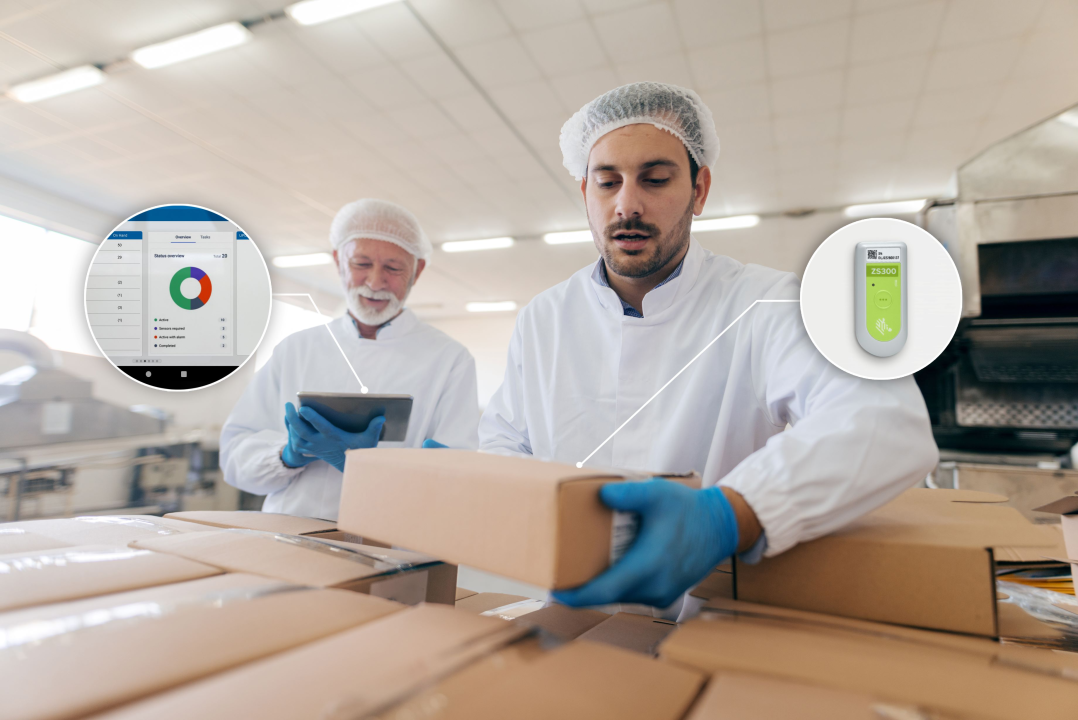The Importance of Environmental Sensors in the Food Supply Chain
July 9, 2024
By Bar Code Integrators, Inc.

In today’s world, the food supply chain is more complex and extended than ever. From farm to table, food products traverse multiple stages and geographies, making it imperative to maintain stringent controls over environmental conditions to ensure safety, quality and regulatory compliance. Environmental sensors, like those developed by Zebra Technologies, play a critical role in this process by providing real-time monitoring and actionable insights.
Here’s why incorporating these sensors into the food supply chain is essential:
Ensuring Food Safety and Quality
One of the most significant challenges in the food supply chain is maintaining the proper storage conditions for perishable goods. Temperature fluctuations can drastically affect the shelf life and safety of food products. If the temperature is too high, it accelerates the growth of microorganisms, while temperatures that are too low can cause food injuries and render products unmarketable. Zebra’s environmental sensors monitor these conditions continuously, ensuring that any deviations are detected and addressed promptly.
Compliance with Regulations
Food safety regulations at both state and federal levels are stringent and constantly evolving. Compliance is not only a legal requirement but also a critical component of maintaining consumer trust. Zebra’s sensors help businesses adhere to these regulations by providing accurate and continuous monitoring data, which can be easily accessed and used for regulatory reporting.
Reducing Food Waste
Food waste is a significant issue, with about 22% occurring after production but before consumption in the U.S. alone. This waste often results from inadequate storage and transportation conditions. By using Zebra’s environmental sensors, businesses can monitor and maintain optimal conditions, thereby reducing spoilage and waste. This not only helps the environment but also improves the bottom line for companies by preserving more sellable inventory.
Enhancing Supply Chain Visibility
Visibility is key to managing a complex supply chain effectively. Zebra’s environmental sensors provide real-time data on the temperature and location of products throughout the supply chain. This continuous visibility allows companies to react quickly to any issues, optimize routes, and ensure that products reach their destination in the best possible condition.
Leveraging Advanced Technology
Zebra’s environmental sensors, such as the ZS300 and ZB200 Bridge, use advanced Bluetooth Low Energy (BLE) technology and cloud integration to provide robust monitoring solutions. These sensors offer a wide temperature range with high accuracy and can be integrated into existing workflows, reducing manual intervention and enhancing operational efficiency. The sensors’ data can be accessed via Zebra’s cloud platform, allowing for detailed analysis and timely decision-making.
Diverse Environments Requiring Environmental Sensors
Environmental sensors are essential across various stages and environments within the food supply chain. Here are some critical areas where these sensors play a pivotal role:
1. Farms and Greenhouses:
• Temperature and Humidity Monitoring: To ensure optimal growing conditions and prevent crop spoilage due to adverse weather conditions.
• Soil Moisture Sensors: To maintain appropriate irrigation levels, preventing both under- and over-watering of crops.
2. Processing Plants:
• Refrigeration Units: Monitoring temperature to ensure perishable items like dairy, meat, and produce are stored at safe temperatures during processing.
• Production Lines: Ensuring that environmental conditions meet food safety standards to prevent contamination during processing.
3. Warehouses and Distribution Centers:
• Cold Storage Facilities: Maintaining the cold chain for items such as frozen foods, ensuring they remain at safe temperatures until they reach their final destination.
• General Storage Areas: Monitoring temperature and humidity to prevent spoilage of dry goods and other perishable items.
4. Transportation:
• Refrigerated Trucks and Containers: Ensuring consistent temperature control during transit to prevent spoilage and ensure food safety.
• General Cargo Transport: Tracking environmental conditions to ensure all types of food products are transported under optimal conditions.
5. Retail Environments:
• Supermarkets and Grocery Stores: Monitoring the temperature of display coolers and freezers to ensure that perishable items are stored safely for consumers.
• Small Retailers: Ensuring that refrigeration units and storage areas maintain appropriate temperatures to prevent food spoilage.
6. Food Service and Hospitality:
• Restaurants and Cafeterias: Monitoring storage units to ensure food safety and compliance with health regulations.
• Catering Services: Ensuring that food remains at safe temperatures during transport and serving.
Conclusion
Incorporating environmental sensors into the food supply chain is no longer optional but a necessity. These sensors ensure food safety, help comply with regulations, reduce waste, and enhance visibility throughout the supply chain. Zebra Technologies, with its innovative and reliable sensor solutions, provides the tools needed to meet these challenges head-on. By adopting such technologies, companies can ensure that their products remain safe, high-quality, and compliant from farm to table. This comprehensive approach not only safeguards consumer health but also enhances operational efficiency and profitability for businesses across the food supply chain.
We will be showcasing innovative solutions at our booth #2877 (co-hosted with Zebra Technologies and Inyxa) during the IFT First Annual Expo at McCormick Place in Chicago, IL from July 14-17, 2024. Don’t miss this opportunity to see how technology can make a difference in your operations. Learn more about the event here. Schedule your visit to maximize your time at the show by filling out a Meeting Request Form here.
For over 30 years, Bar Code Integrators, Inc (BCI) provides fully integrated solutions for bar code data collection, bar code printing, mobile computing, wireless LAN infrastructure, RFID, and other related technologies. Through innovation and experience in Auto-ID technology, our solutions improve efficiency, accuracy, and a company’s bottom line with a valid and measurable return on investment.